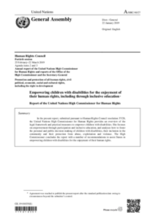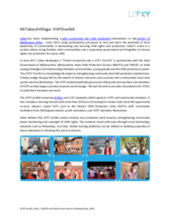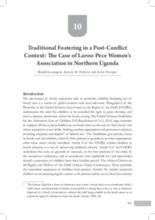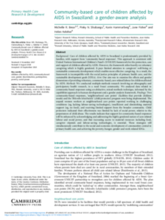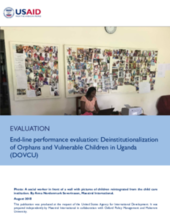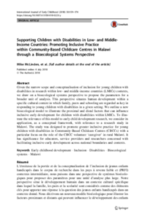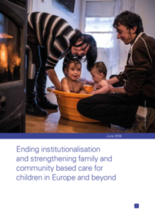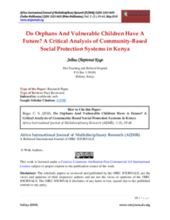Displaying 31 - 40 of 312
In the present report, submitted pursuant to Human Rights Council resolution 37/20, the United Nations High Commissioner for Human Rights provides an overview of the legal framework and practical measures to empower children with disabilities.
This article is a qualitative phenomenological study seeking to examine the perceptions, views, and feelings of the orphans and vulnerable children (OVC) and their caregivers on their lived experiences in OVC care and support in Zimbabwe.
This Virtual Companion Tool Kit for child protection committees at the village (VCPCs) is a knowledge kit aimed at strengthening community-led child protection mechanisms.
The objective of this paper is to examine the situation of orphans and vulnerable children (OVC) in Dar es Salaam, Tanzania in existing alternative care systems and explore the treatment of OVC in these systems.
This chapter from Social Work Practice in Africa: Indigenous and Innovative Approaches presents a traditional fostering model adopted by a group of women in Northern Uganda, analysing its potential for building resilience and for contributing to social capital and social development within the broad context of post-conflict situations.
The aim of this study from Primary Health Care Research & Development was to examine the effects and gender dimensions of providing voluntary, community-based, care-related labour for children affected by AIDS.
The objective of this evaluation is to assess the performance of the “Deinstitutionalization of Orphans and Vulnerable Children Project in Uganda” (DOVCU) with regards to the creation of sustainable changes in the lives of two beneficiary groups, namely 43,000 vulnerable children living in targeted households and 2,000 children at risk as a result of an integrated package of support.
This study draws on a bioecological systems perspective to propose the parameters for a broader unit of analysis of inclusion for young children with disabilities in research within low- and middle-income countries (LMICs) contexts.
This document was developed by UNICEF to influence policymakers in the European Union to strengthen their commitment to assisting governments’ transition from institutional care to community-based care in the next Multi-Annual Financial Framework (2021-2027).
This paper analyses the role of community-based child protection structures for the survival and development of orphans and vulnerable children.

